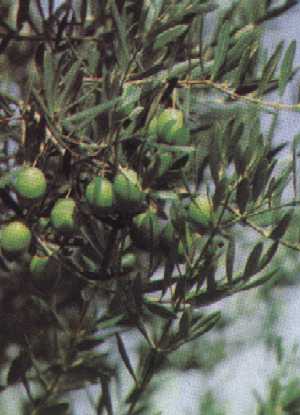
"I am daughter of the sun...
I am the olive tree,
the blessed one".
K. Palamas
The olive tree is inextricably linked with greek history, culture and life, as is olive oil, the product of its fruit, which the Greeks refer to simply as "oil".
Olive oil has been a central feature of greek life since antiquity. The origins of olive tree cultivation are lost in prehistory. Greek mythology presents it as a sacred tree blessed by Athena, the ancient goddess of wisdom. The special urns and storage pits unearthed among the ruins of Knossos in Crete indicate that in 2,000 B.C. the ancient people of the region utilised olive oil and olives pretty much the same way as their descendants do today.
Among Aristotle’s works, the "Athenaeon Politeia" also shows the significance of olive oil in ancient greek life. For the ancient Greeks, the olive tree represented, among other things, power and peace: power, because of its longevity and its ability to flourish on the most barren terrain. And it represented peace, possibly because of its solitary tranquility. For this reason, the winnors of the ancient Olympic Games, who represented the same ideals of strength and peace, were awarded the "kotynos", a wreath made from a branch of wild olive. The ambassadors of peace as well, in order to indicate their intentions, offer an olive branch to their interlocutors.
The English historian Alfred Zimmern believes that the olive tree is a greek native that spread initially to the greek colonies in southern Italy and then proliferated over the entire Mediterranean.
For the Greeks the oil was always considered as a gift from the gods. Texts and findings testify to its economic value. Nor was olive oil used solely as a food. It had a great many uses, covering the entire spectrum of economic and social activity, which was why Homer called it "liquid gold". Some of its uses were the following: in cleaning, in making perfumes, in beauty care, in medicine and in lighting. Because of these various uses, olive oil was a product with great commercial value: Plutarch reports that Solon the law-giver permitted the Athenians to export only oil.
In recent decades the medicinal value of pure olive oil has once again come to the foreground, and modern medicine had a chance to admire the scientific expertise of ancient medical practices. Research has demonstrated that, in addition to its nutritional value, olive oil is an invaluable factor for general maintenance of the human organism, and an effective means in the prevention of cardiovascular disease. Because of the monounsaturated oleic acid it contains, controls the cholesterol in the blood by improving the level of the lipoprotein HDL, and as a result the metabolism of cholesterol, which is a major factor in heart disease.
In addition, the physical properties of olive oil make it the most suitable edible oil, easily absorbed by the body, with beneficial effects on the stomach.
There are countless factors contributing to the special qualities of greek olive oil. Special climate and soil conditions, the purifying and vivifying properties of the greek sun, harvesting at the precise moment when the olives are most suitable for pressing, gathering the olives right from the tree before they fall to the ground and deteriorate and processing them as soon as they are harvested without any chemical additives whatsoever. All these factors together result in pure olive oil with very fine qualities, considered by many as the best in the entire world.
The conditions for growing olives and the methods of producing olive oil have changed very little over the years. Olive oil is produced in special facilities called "liotrivia" or oil presses. Greece is the country with the highest per capita consumption of olive oil in the world. The rest of the green olive oil it is exported and it is in high demand on markets abroad. On the basis of official statistics, virgin olive oil (a natural product, full-flavoured, with a pleasant aroma and unrivalled nutritional properties) marked the greatest rate of increase in exports in the period 1990-1998, ranging in bulk terms at around 400,000 tons of olive oil annually production, making Greece the 3rd largest producer in the world.
BIOLOGY : "The Greek olive oil"
3rd FORM : 4th hour
TEACHER : Waltraud Kolar
ASSISTANT TEACHER : Charikleia (Lila) Nifli
IT-TEACHER: Gottfried Eggenhofer
DATE : 10/05/1999
NOTE: Pupils wrote a summary on greek olive oil in german after the presentation in the end of the lesson.